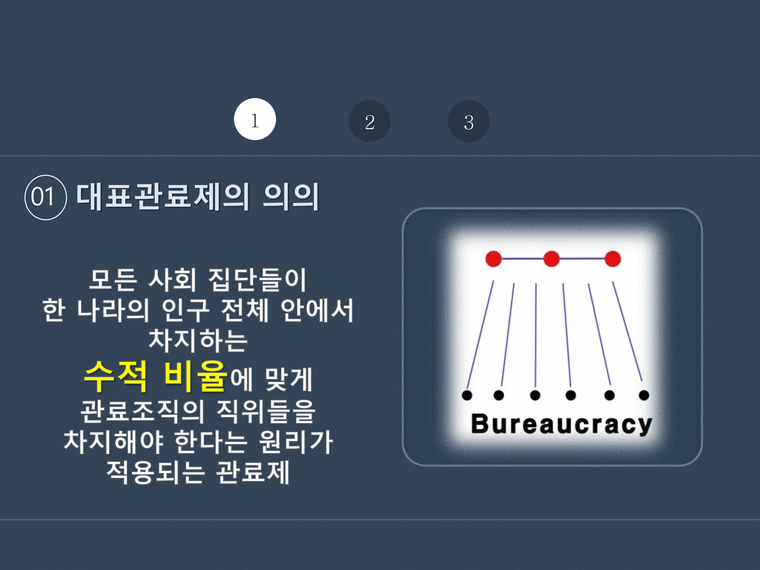대표관료제(Representative Bureaucracy)는 공공기관의 구성원이 그 사회의 다양한 집단(성별, 인종, 계층, 지역 등)을 공정하게 대표할 수 있도록 설계된 제도나 원칙을 의미합니다. 이 이론은 관료제가 단순히 행정 업무를 수행하는 기구를 넘어, 사회적 다양성과 형평성을 반영하여 정책의 정당성과 효과성을 높이는 역할을 해야 한다고 주장합니다.
대표관료제는 두 가지 측면에서 논의됩니다. 첫째, 구성적 대표성(대표의 다양성)은 관료제 구성원들이 인구의 다양한 사회적, 문화적 배경을 반영하는 것을 말합니다. 둘째, 적극적 대표성(대표의 실질적 행동)은 관료가 자신이 속한 사회적 집단의 이해관계를 반영하는 정책을 형성하고 집행하는 것을 뜻합니다.
대표관료제의 장점은 다음과 같습니다.

- 정책 결정 과정에서 다양한 관점을 포함함으로써 정책의 형평성을 증대시킵니다.
- 사회적 신뢰와 정당성을 강화합니다.
- 소수자 및 약자의 목소리가 정책에 반영될 수 있는 기회를 제공합니다.
그러나 대표관료제는 현실적으로 구성원의 다양성을 확보하는 과정에서 역차별 논란이나 전문성 약화 등의 문제를 야기할 수 있다는 비판도 받고 있습니다. 이를 극복하기 위해서는 적절한 균형과 체계적인 제도 설계가 필요합니다.
Representative Bureaucracy refers to a concept or principle where public institutions aim to reflect the diversity of society (e.g., gender, race, class, region) within their administrative structures. This theory argues that bureaucracy should go beyond merely implementing administrative functions and instead embody social diversity and equity to enhance the legitimacy and effectiveness of policies.
This concept is discussed in two dimensions. First, passive representation focuses on ensuring that the composition of bureaucracies mirrors the demographic diversity of the population. Second, active representation emphasizes that bureaucrats should advocate for the interests and needs of the social groups they represent in the policymaking and implementation process.
Advantages of representative bureaucracy include:
- Enhancing equity in policymaking by incorporating diverse perspectives.
- Strengthening social trust and legitimacy in governance.
- Providing opportunities for marginalized groups to have their voices heard in public policies.
However, critics argue that achieving diversity in bureaucratic representation may lead to issues such as reverse discrimination or a potential decline in professional competence. Addressing these challenges requires a balanced and systematic institutional design.